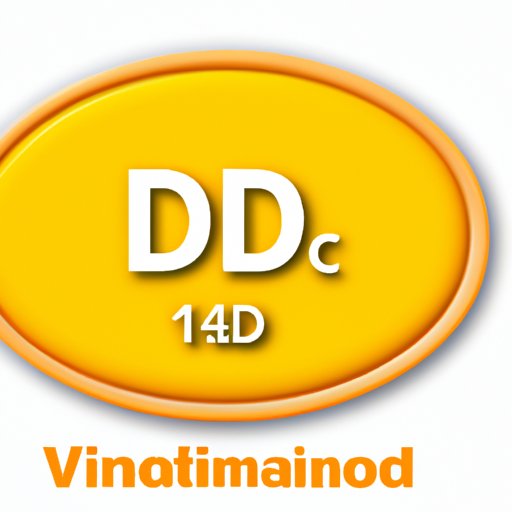
Introduction
Vitamin D is an essential nutrient that plays a crucial role in the body’s overall health and well-being. It is one of the few vitamins that the body can produce on its own in the presence of sunlight, and it is also found naturally in some food sources, such as fatty fish and eggs. However, many people struggle to get enough vitamin D, which has sparked a growing interest in vitamin D supplements. In this article, we explore how much vitamin D can be safely consumed in a day and why it is essential to understand the recommended daily vitamin D intake limits.
The Risks and Benefits of High-Dose Vitamin D Consumption
Consuming sufficient quantities of vitamin D is crucial for overall health as it helps maintain healthy bones, promotes a healthy immune system, and improves overall mood. In addition, vitamin D has been shown to reduce the risk of some cancers and protect against heart disease. However, there are various risks associated with high doses of vitamin D consumption. High doses of vitamin D supplementation can lead to vitamin D toxicity, and this can cause a range of symptoms such as nausea, vomiting, kidney stones, bone pain, and confusion.
Understanding Vitamin D Toxicity: What You Need to Know
Vitamin D toxicity is a rare but serious condition that occurs when there is too much vitamin D in the body. It can be caused by excessive intake of supplements, food, or even sunlight exposure. Some of the common side effects associated with vitamin D toxicity include a decrease in appetite, fatigue, constipation, and muscle weakness. In severe cases, an excess of vitamin D intake can lead to kidney failure or even death. Therefore, it is crucial to understand the signs and symptoms of vitamin D toxicity and how to avoid it by staying within the recommended daily limits.
Maximizing Your Daily Vitamin D Intake: A Scientific Approach
The recommended daily intake of vitamin D varies by age group and ranges from 400-800 international units (IU) per day. However, some people may require higher doses of vitamin D supplementation due to various factors such as insufficient sunlight exposure or a vegan diet. To maximize your daily vitamin D intake, eat a healthy diet that includes vitamin-D-rich foods such as fatty fish, eggs, and fortified foods. Spending a short amount of time in the sun allows for the body to produce vitamin D naturally. If you are supplementing with vitamin D, it is best to consult with your doctor to determine the optimal dosage for you, as well as to ensure that you are not taking in too much vitamin D.
The Importance of Getting Enough Vitamin D and How Much is Too Much
Getting enough vitamin D is essential for overall health, particularly in maintaining optimal bone and immune function. However, it is important to understand how much is too much vitamin D to ensure that you do not experience vitamin D toxicity. When taking supplements, it is recommended to stick to 600 to 800 IU per day for most adults, but some individuals may require higher doses.
Debunking the Myths: Separating Fact from Fiction About Vitamin D Dosage Limits
There are common misconceptions about the intake of vitamin D supplements and how much is safe. Some people believe that taking high doses of vitamin D supplements for a short period will not have adverse effects, while others believe that taking mega-doses of vitamin D supplements can help prevent diseases such as cancer. However, such beliefs are not substantiated scientifically. It is important to rely on factual health information and adhere to the recommended intake limits to avoid vitamin D toxicity.
Conclusion
Vitamin D is an essential nutrient that plays a significant role in overall bodily health. However, it is crucial to understand how much vitamin D is too much and to avoid toxicity. While many individuals struggle to get enough vitamin D from diet and sunlight exposure, there are safe ways to supplement with vitamin D. It is essential to speak to a healthcare provider to determine the optimal vitamin D intake for you based on your unique needs and lifestyle. A balanced vitamin D intake can help promote optimal health and well-being.





